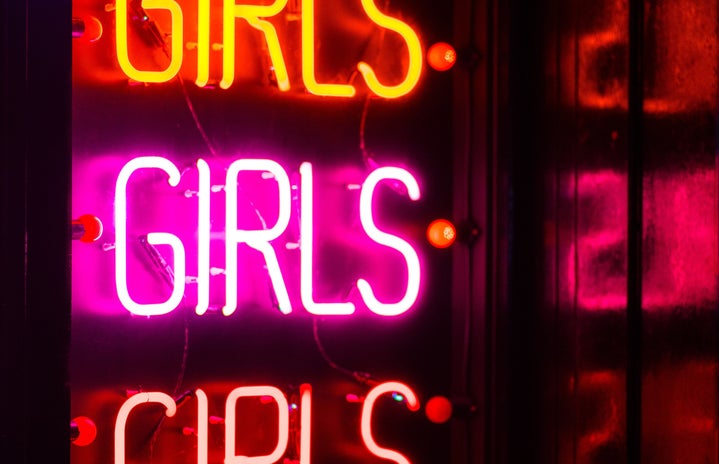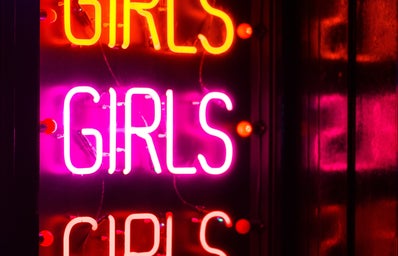“Honey, you need to text me where you’re going tonight. I want to know who you’ll be with, how you’re getting there, and when and how you plan on coming home.”
A mom recites this phrase to her daughter who’s leaving for a high school party. Many of you might feel this is a reasonable request from a parent. However, at the back of her mind, she’s also worrying about her daughter’s safety— a lot.
“Don’t walk alone”, she says as her daughter nods reassuringly, closing the door behind her.
Flashforward four years: that same daughter is leaving for a pub night with her university sorority sisters.
“Don’t drink too much, don’t leave your drink unattended and don’t get into a car with any strangers. Oh, and don’t go anywhere alone— even the washroom!” the mom says.
After her daughter leaves, her son is getting ready to go out to that same pub night with his friends.
“Have a good time, dear. Don’t drink and drive,” she says and watches him go.
It’s clear that she’s far more worried about her daughter— although there’s less than two years apart between the siblings, you might question what makes their experiences so different. That, my friends, is called the double standard.
What you need to know
A double standard is defined as “a set of principles that applies differently and usually more rigorously to one group of people or circumstances than to another,” according to Merriam-Webster.
Unfortunately, this double standard exists in one too many families to date and can range from unfair practices in anything, like sexual exploitation, job wages, and even criticisms based on attitudes and familial beliefs for one gender and not the other. As a 21-year-old woman, it’s upsetting to hear that what’s usually okay for men to do is often frowned upon for women to do. A lot of this has to do with their dominance in society— the male figure is presented as strong, brave, stoic and is always considered the alpha among other members of the group. Males are supposed to represent the protection we require, hence the father being the patriarch of the family. Females are the more nurturing gender of the two; in an older stereotype, the women would cook and clean, tending to their families and friends if need be, while the men went out and worked. This stereotype began many years ago and is still a great example of domesticated gender inequality today.
“Blue is for boys, pink is for girls.” or “You’re not supposed to be strong— how can you lift that?”
These double standards reign on and are engraved in the minds of many, forming a very specific way of living for most.
Where do they exist?
As per the first paragraph, I think it’s clear that double standards exist EVERYWHERE. Here are just a few examples of where you might run into those ideas of double standards:
Gender Pay Gap — It’s the year of 2020 and there still remains a disparity between the amount women are paid versus men. Gender remains the sole difference when factoring in all compensable factors, according to PayScale. To each $1 a man receives, women obtain $0.81 within the uncontrolled gender pay gap in 2020, while with each $1 a man attains in the controlled gender pay gap, the earnings for women account to $0.98, according to PayScale’s analysis. So to put it into perspective, a male and female could have similar jobs with the same attributes and characteristics, but the female will be paid less than the male, no matter what. The Equal Pay Act became law after John F. Kennedy signed off on it in June of 1963, but we still lack equality after a few decades have passed, according to Infoplease.
Workplace — This is one of my favourites. I work in retail customer service, however sometimes, my job requires labour. Yeah— myself along with my other female co-workers will be attempting to lift (key word: attempting) kayaks, trampolines and even large microwaves and fire tables. Nine times out of ten, when we run into these types of situations, a customer will pipe up: “Get a guy to carry that— you won’t be able to do it.” or “Do you need a hand? You’re sure? I mean the boys over there look pretty strong.”
Customer service representative or not, I often snicker and fire back some sarcastic or petty remark. Why wouldn’t we be able to lift these things? Implying that the female species isn’t capable of strength or agility is insulting— yet again, that picture-perfect image that men should be strong and heavy while women should be petite and fragile. Well ladies, you’ll be happy to know that according to a 2018 PNAS study, we will in fact have lengthier lives than men. See ya, suckers!
Sex – The sexual double standard has always been a big one: the known consideration is that women and men are held to different standards of sexual conduct. In an American society, girls and women face condemnation whenever they consider partaking in a sexual act, contrary to boys and men being honoured for the sex they have, according to a 2009 NCBI article.
The approval these men receive would otherwise permanently harm a woman’s prestige: the dresses and miniskirts that we— as women— hold down as you make us feel uneasy, the catcalls, the distractions, the sweet talk— and it’s all for nothing. The second you have sex with us, though, it’s “Good job, son!”— from a proud dad. Imagine life for the daughter— hint: it definitely isn’t that easy.
Safety — The sex and going out stereotypes work hand in hand as both are dependent on each other. Oftentimes, when a woman goes out, she needs to walk with a partner or in broad daylight. Most men are able to walk alone— why? The common stereotype is that females must rely on male figures to save them and prevent them from finding their way into trouble.
Siblings — This one definitely depends on the household: as a Canadian with an Irish background, I never experienced much of this, except the constant excuses of “he’s only 13” every time I tried to get my brother to do something useful. At that age, I was definitely doing more than he is now. Anyway, the sibling double standard is typically where Eastern European families thrive— and not necessarily in a good way. Depending on the age difference, gender and the number of siblings, there are a lot of differences between the ways parents treat each one of their kids.
Opinions and experiences
I desperately needed to know more about the ways double standards exist within households, so I reached out to individuals with siblings, asking them how their sibling’s life at home differed than theirs.
First-year student Olivia Lussow spoke to me about the difference between her relationship with her parents versus her sisters.
“I have two sisters, one is 26 and one is six, but for a long time, I was the ‘boy’ of the family and not necessarily by choice. My sister got to go to the spa while my dad took me camping. I thought it was strange that they made me do everything they would want to do with a son. It was pretty much them saying that one of us has to do the boy stuff!”
Second-year student Sara Belas and her brother experienced different lifestyles.
Belas recounted, “At age 14, my [older] brother was forced to learn how to take the city bus out with friends but my parents wouldn’t let me take that bus until I was 17, even in a large group. My brother was allowed to go up to our cottage with whatever gender of friend he pleased at the age of 16 and stay the night, but here I was at 18, begging them to let me drive up just for a day. The difference, according to them? I was a girl.”
Fourth-year student Alissa Ermakov realized calling her Eastern European mother out was the only way to stop the sexism she was experiencing.
“My mom would constantly get mad at me for not finishing my chores or doing enough around the house, but would never yell at my brother. He was older but seemingly had less responsibilities. She only stopped once I got older and called her out.”
Fourth-year student Sofia Mironova experienced a lifestyle similar to Ermakov’s.
“My parents were both raised with very Russian-based cultural norms. My older brother and I were both expected to clean but more so from me. I was also expected to have my life together by Grade 9 and felt pressure to do something worthwhile— or else, in my mind, I would let down my parents— while my brother plays video games all the time and doesn’t face the same pressure. The women in a Russian household are always expected to cook and clean, and my grandma made my mom do the same things, but it’s really sexist.”
Notice how it’s only girls who were able to speak on these experiences? Upon reaching out to boys, I noticed many of them felt uncomfortable speaking or didn’t have anything to speak on. The reason being? They’re treated very differently than females, in most cases, and they know it.
Is the end near?
To be honest with you all, there’s no way of telling if an end for double standards is near. They’ve been around for centuries and haven’t been completely eliminated. The reason being, however, is because we need leadership to take the right practices to put these stereotypes to rest. Addressing the double standards is the first step in the process of attempting to eradicate them altogether. As you can tell by this article, there’s a lot that comes with being a woman that, unfortunately, men don’t have to deal with. Men will never even begin to be able to understand what it’s like to feel unsafe walking alone at night or get dress coded at school for shorts that are too short, all because of the unnerving gaze of a male principal. Either way, it’s important to bring these differences to light— collectively, as women, we demand better. As women, the stakes are higher and it’s up to us to change the way the future is going to play out— hopefully, it will be in our favour.



